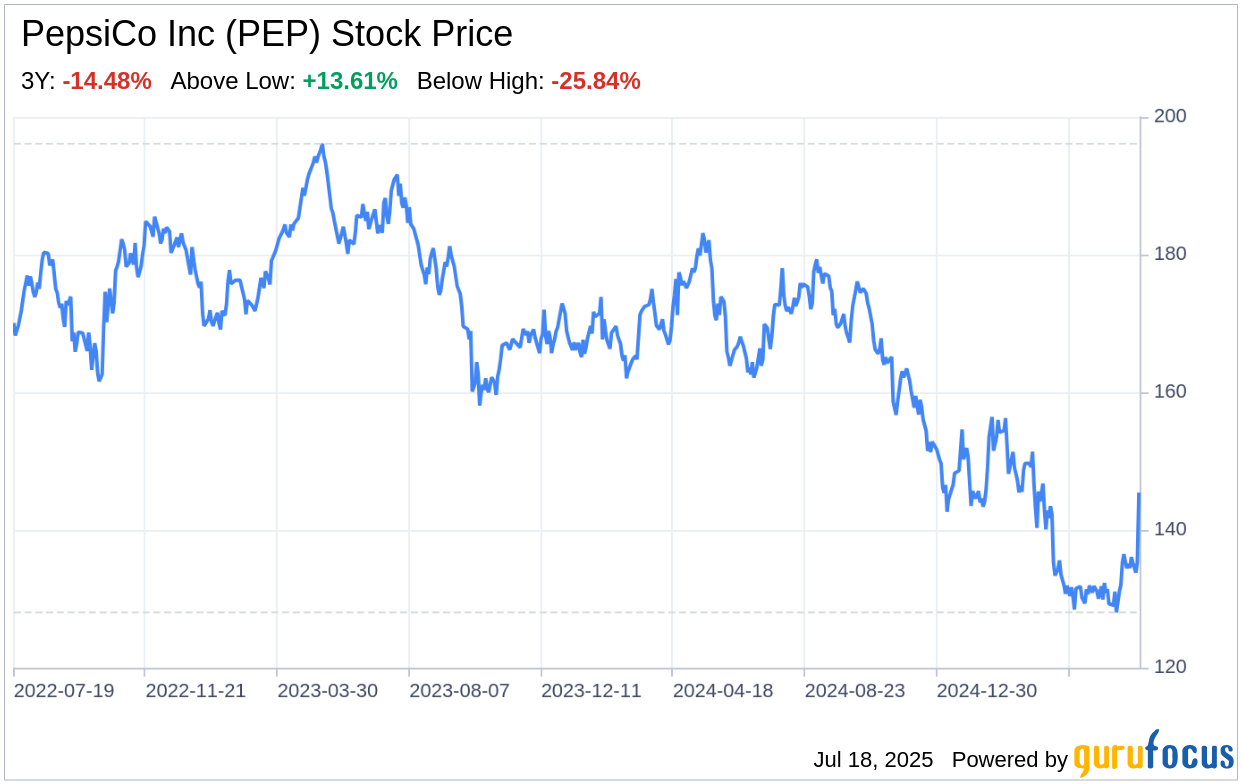On July 17, 2025, PepsiCo Inc (PEP, Financial) filed its latest 10-Q report, offering a detailed glimpse into its financial performance for the 24 weeks ended June 14, 2025. The company reported a net revenue of $40,645 million, a slight decrease from the $40,751 million reported in the same period of the previous year. Gross profit stood at $22,415 million, with a dip in operating profit to $4,372 million compared to $6,765 million in the prior year, largely due to impairment of intangible assets. Net income attributable to PepsiCo was $3,097 million, a decrease from $5,125 million year-over-year. The basic and diluted earnings per share were $2.26 and $2.25, respectively, down from $3.73 and $3.71. These figures set the stage for a nuanced SWOT analysis, highlighting the company's internal dynamics and external market conditions.

Strengths
Brand Portfolio and Market Presence: PepsiCo Inc's strength lies in its diverse and robust brand portfolio, which includes iconic names like Pepsi, Mountain Dew, Gatorade, Lay's, Cheetos, and Doritos. The company's market presence is formidable, with a leading position in the global savory snacks market and a strong second place in the global beverage sector. The brand equity of PepsiCo's products drives consumer loyalty and provides a competitive edge in the marketplace. The company's ability to maintain a high gross profit margin of $22,415 million, despite a slight decrease in net revenue, is indicative of the strength of its brands and pricing power.
Operational Efficiency and Scale: PepsiCo Inc's operational efficiency is another key strength. The company owns a significant portion of its manufacturing and distribution capacity in the US, which allows for better control over its supply chain and cost management. This vertical integration is reflected in the company's ability to manage cost of sales effectively, which stood at $18,230 million for the 24 weeks ended June 14, 2025. The scale of PepsiCo's operations also enables it to negotiate favorable terms with suppliers and distributors, further enhancing its competitive position.
Weaknesses
Impairment Charges Impacting Profitability: A notable weakness in PepsiCo Inc's recent performance is the significant impairment of intangible assets, which amounted to $1,860 million. This has had a substantial impact on the company's operating profit, which decreased to $4,372 million from $6,765 million in the previous year. The impairment charges, particularly related to the Rockstar and Be & Cheery brands, suggest challenges in certain product lines and potential overvaluation of assets in the past. This could indicate a need for strategic reassessment of the company's brand portfolio and investment decisions.
Dependence on North American Market: While PepsiCo Inc has a global footprint, there is a considerable dependence on the North American market, which could be a weakness in the face of geopolitical tensions and market saturation. The North American segment's performance is critical to the company's overall success, and any economic downturn or shift in consumer preferences in this region could disproportionately affect PepsiCo's financial results.
Opportunities
International Expansion and Diversification: PepsiCo Inc has the opportunity to further expand its international presence, which currently accounts for 40% of total sales and operating profits. Growth in emerging markets, where the demand for snacks and beverages is rising, could be a significant driver of future revenue. The company's strong brand recognition and distribution capabilities can be leveraged to capture market share in these regions.
Innovation and Product Development: Innovation in product offerings, particularly in the health and wellness segment, presents an opportunity for PepsiCo Inc. As consumer preferences evolve towards healthier options, the company can capitalize on this trend by developing new products or reformulating existing ones to meet these demands. This could lead to increased market share and revenue growth in a rapidly expanding market segment.
Threats
Competitive Pressure and Market Dynamics: The beverage and snack food industries are highly competitive, with numerous players vying for market share. PepsiCo Inc faces intense competition from both large multinational corporations and local companies. The ability to innovate and adapt to changing consumer preferences is crucial in maintaining a competitive edge. Additionally, market dynamics such as shifting consumer trends towards healthier options and the potential for regulatory changes affecting product formulations or marketing practices pose threats to PepsiCo's traditional product lines.
Economic and Geopolitical Uncertainties: Economic downturns, geopolitical tensions, and changes in trade policies can have adverse effects on PepsiCo Inc's operations. The company's significant international exposure makes it susceptible to currency fluctuations, tariffs, and other trade barriers. These factors can increase operational costs and affect profitability. Moreover, the ongoing COVID-19 pandemic continues to create uncertainties in the global economy, which could impact consumer spending and disrupt supply chains.
In conclusion, PepsiCo Inc (PEP, Financial) exhibits a strong brand portfolio and operational efficiency as its core strengths, while facing challenges from impairment charges and dependence on the North American market. Opportunities for international expansion and product innovation are counterbalanced by competitive pressures and economic uncertainties. The company's strategic focus on leveraging its strengths and addressing its weaknesses, while capitalizing on opportunities and mitigating threats, will be crucial for its sustained growth and market leadership.
This article, generated by GuruFocus, is designed to provide general insights and is not tailored financial advice. Our commentary is rooted in historical data and analyst projections, utilizing an impartial methodology, and is not intended to serve as specific investment guidance. It does not formulate a recommendation to purchase or divest any stock and does not consider individual investment objectives or financial circumstances. Our objective is to deliver long-term, fundamental data-driven analysis. Be aware that our analysis might not incorporate the most recent, price-sensitive company announcements or qualitative information. GuruFocus holds no position in the stocks mentioned herein.
